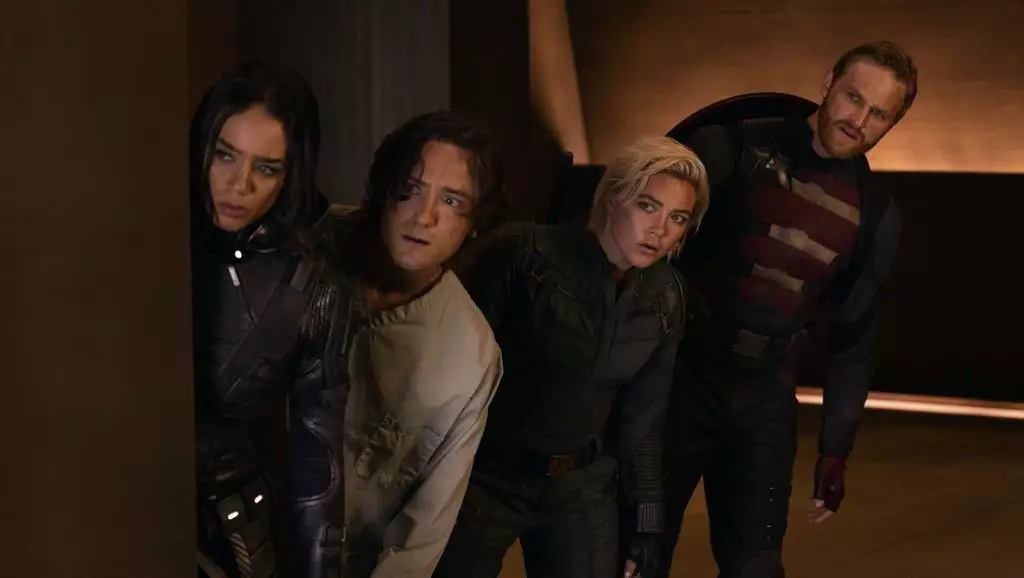Marvel Studios’ latest installation, *Thunderbolts*, has seen a significant decline in its box office performance since its initial weekend launch. Projected earnings of $30 million in its second weekend indicate a staggering drop of 60% or more from its debut figures. This dramatic decrease raises critical questions about the future of superhero films in an increasingly competitive cinematic landscape. As franchises reach saturation, what once seemed like an unending wave of blockbuster success may be transitioning into a realm of mediocrity. An impressive multi-million dollar opening does not guarantee sustained audience interest or financial viability, particularly as summer releases loom on the horizon. Will audiences continue to flock to theaters, or have they grown weary of superheroes fighting each other amidst a slew of predictable tropes?
The Competition: Sinners vs. the Rest
Warner Bros.’ *Sinners*, on the other hand, defies the odds. With a running total nearing $200 million, it has maintained its position in the box office with a projected weekend haul of $23 million to $25 million. Unlike *Thunderbolts*, *Sinners* has cultivated repeat viewership through compelling storytelling and a fresh take on genre conventions, reinforcing the notion that quality often trumps quantity when it comes to cinematic offerings. The distinguishing factor appears to be a narrative that resonates with audiences, allowing it to maintain momentum amidst a tidal wave of underwhelming releases.
The upcoming *Final Destination: Bloodlines* is slated to debut alongside *Thunderbolts*, pulling audiences’ focus to another franchise. While horror reboots often find traction, the question remains whether it can pull viewers away from titles that are struggling to sustain interest. The capacity of the box office to accommodate multiple genres and franchises simultaneously is an ongoing experiment, with the stakes higher than ever for studios that depend on blockbuster hits.
The Fragility of New Releases
Amidst these heavy-hitting films, various newcomers appear to be floundering, emphasizing the volatility of box office performance. The horror flick *Clown in the Cornfield* shows promise with its favorable reception post-SXSW, but will it be substantial enough to connect with broader audiences? While critical acclaim can lay the groundwork for initial success, actual box office performance remains the ultimate litmus test. The eerie truth is that even with positive critiques, a lack of audience engagement can doom a film to box office obscurity.
Similarly, Lionsgate’s *Shadow Force*, featuring Kerry Washington and Omar Sy, is poised to underperform based on the tepid reception it has received, with a mere 50% rating on Rotten Tomatoes. In a time when audiences demand fresh narratives and authentic performances, sub-par films are unlikely to hold their ground. This begs the question—how can studios pivot to regain audience interest and trust in a market that feels increasingly saturated with substandard content?
The Hopeful Glimmer: Fight or Flight
Not all is bleak in the cinematic landscape; there is hope on the horizon with Vertical’s *Fight or Flight*, which has emerged with impressive initial preview numbers. With a favorable rating and compelling premise, it may succeed where others have faltered, harnessing positive word-of-mouth and audience advocacy. It’s clear that in today’s market, films that blend innovative storytelling with audience engagement will rise above mediocrity, allowing for a potential shift back into creative storytelling and cinematic experiences.
As consumers, there’s an expectation for entertainment that breaks the mold—not rehashes of tired narratives or predictable formulas. The promise of new ideas and exhilarating stories is what brought many audience members to the theaters in the first place. If studios want to ensure robust box office returns, they must embrace originality alongside production values.
The current state of box office performance highlights an essential reminder: audience engagement must be both nurtured and earned. The notion that an established franchise automatically guarantees fanfare may need to be reevaluated, as fresh perspectives continue to rise to the surface. Will Hollywood heed the call for renewed authenticity, or will it persist in replaying underwhelming formulas? As a cinephile, I find myself hoping for a turnaround toward genuine creativity in storytelling.

